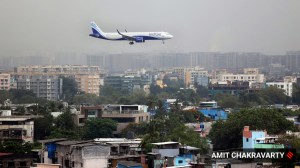Aircrash survivors grapple with dreams and nightmares
Year after Mangalore crash,some still wait for promised Air India jobs,others rejected offer due to low salaries
In the evenings,29-year-old Pradeep G K prefers to watch waves crash against the shore at a beach barely 50 metres from his home. The sound helps him to drown the memories of that ill-fated morning a year ago,when Air India Express IX 812 from Dubai crashed at the Mangalore airport,killing 158,including crew members. Pradeep,along with seven others,lived to tell the tragic tale.
I cant lift any weights, says Pradeep,my right wrist still hurts. The plane crash,on May 22,2010,not only snatched his Rs 36,000 per month technicians job at Dubai,but also his sound sleep. His Dubai work visa expired a couple of months ago,and his mother starts crying each time he mentions going there to look for work. She has seen it with her eyes. She had come to receive me at the airport that day, he says.
Speaking to The Sunday Express on the phone,he says hes trying hard to get a job. Air India had promised me a job. But its been a year and nothing has happened, says Pradeep,who lives in a village 40 kilometres from Mangalore.
Most of the survivors The Sunday Express spoke to are still trying to build their lives from scratch,awaiting jobs promised by Air India.
Joel Pratap DSouza,25,a machine operator in Dubai,lost his job to someone else. I have no work. I am at home, says DSouza,who suffered a spinal injury and was put on seven-month bed rest after the crash.
On the insistence of his sister,who is settled in Dubai,DSouza travelled there in October last year. I was very scared when I boarded the flight. Thankfully,my friend was with me.
DSouza took the same Air India Express flight from Mangalore to Dubai and back. For a full day and night before the flight,I couldnt sleep, he says. He avoids meeting other survivors,as it reminds him of the incident. DSouza now hopes to find a suitable job and settle down with a girl of his choice in the next two years. I am looking for a girlfriend,but havent found anybody yet, he says.
Before the crash,Putturismail Abdulla worked in Dubai as a store manager for six years,at a monthly salary of Rs 40,000. Most of the customers were Russian, he recalls. Today,he has no job,but shoulders the responsibility of his parents,wife and a two-and-a-half-year-old daughter.
Air India offered a job at Rs 6,500 per month,and that too on contract. How will I feed my family in such a small amount? says Abdulla,who dropped out after high school. On hopes of receiving a job from Air India,I kept my previous employer waiting. He later hired an Irani.
In January,he went to Dubai to look for a job on a one-way free ticket from Air India. My wife told me not to go. But I had to go. Dubai has work,here it is only expenses. But he returned empty-handed.
During the day,he helps his father on his small coconut farm. In the evenings,he plays with his daughter and tries to forget the tragedy. Doctors said not to remember that morning at all, he says.
Mohamed Usman,a resident of Karkala,Mangalore,got his new passport last month,after the previous one burnt in the plane crash.
My wife had to go to Dubai to sell our house and two cars in Dubai, says Usman,who ran a logistics business in Dubai for 29 years. He had come to Mangalore last year to get his son operated,and has stayed on since then.
I am building commercial property on our land in Karkala, he says. The incident has changed his life. I am more religious now. I pray everyday, says Usman,adding,Now I know what the value of life is.
For 48-year-old Krishnan Koolikkunnu,a resident of Kasargod,Kerala,his nine-year stint in Dubai as an ordinary labourer came to an end with the plane crash. My work visa expired; it is difficult to go there. I have no job, he says.
His parents,wife and two daughters dont want him to go to Dubai,where he earned Rs 15,000 a month. They get scared,and say dont go on a plane.
He watches television when he is reminded of the ghastly accident. The screams of women and children crying those last few seconds… the scenes come back to haunt me, he says. He is thankful he got a new lease of life. So many people died. My parents thank God for returning me alive.
Unemployment haunts Mayankutty KP,a resident of Kerala,too. I went to Dubai just a day before my work visa was to expire to renew it,but I found no work, he says. For six years,he worked in a Dubai firm in its Public Relations department. My mental health is still not right, he says,adding that he is still hoping to get the job promised by Air India.
Two other survivors,Sabrina Nasrinhuq and Ummerfarook Mohammed,could not be contacted.
When contacted,a senior executive from Air India said they had offered jobs to survivors on the basis of their educational qualifications. But most turned down the offers as they didnt match the salaries they were getting in Dubai.
Being a PSU,we have to follow the recruitment guidelines. In this case,on compassionate grounds,we had made job offers to the survivors, said the executive.
Meanwhile,as the survivors try to resurrect their lives,they cling on to the hope of a better future. It is going to rain, says Pradeep. It will get better now.
- 01
- 02
- 03
- 04
- 05































